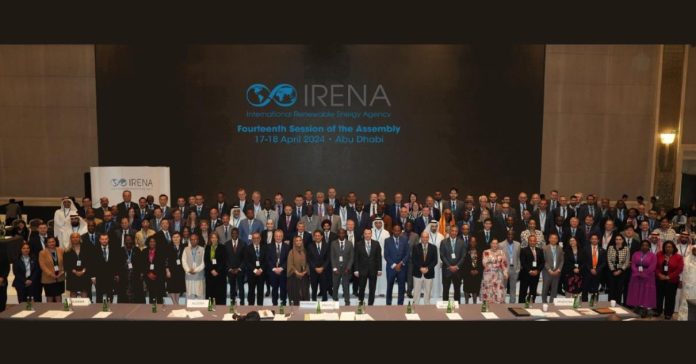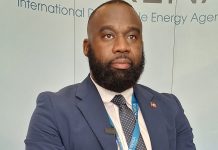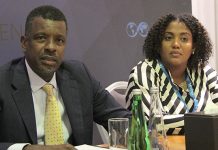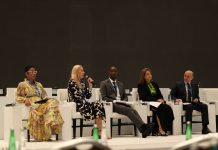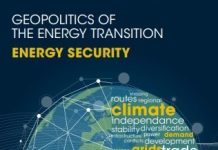The President of the 14th IRENA Assembly and Rwanda Minister of Infrastructure, Jimmy Gasore, has recognised the historic progress achieved at COP28 through the UAE Consensus.
Presiding over the International Renewable Energy Agency (IRENA) Assembly Wednesday, Gasore emphasised the importance of transitioning away from fossil fuels in a just and equitable manner, along with the call to triple renewables and double energy efficiency by 2030.
“COP28 brought us historic progress through the UAE Consensus, including an unprecedented reference to transitioning away from fossil fuels in a just, orderly and equitable matter, as well as the call to triple renewables and double energy efficiency by 2030, amongst other outcomes.
“As we continue to mobilise action on these goals, IRENA’s latest brief on ‘Tracking COP28 outcomes: Tripling renewable power capacity by 2030’ highlights that 2023 set a new record in renewables deployment, adding 473 gigawatts to the global energy mix. Yet, this is less than half of the 1,100 gigawatts of renewables capacity that must be installed each year, by 2030,” the IRENA Assembly President told delegates.
He said tripling renewable power capacity requires concerted efforts to enhance infrastructure, policies and workforce capabilities, underpinned by increased financing and closer international cooperation.
“This is, of course, no small task, but it is vital to mitigation, adaptation and resilience.
“We must design and adapt wide-ranging and cross-cutting policies to ensure that the energy transition remains at the core of our national strategies, not only in the short-term, but also in the long-term,” he stressed.
Gasore highlighted the findings of IRENA’s latest brief on tracking COP28 outcomes, noting the record deployment of renewables in 2023 but emphasising that it falls short of the annual capacity required to meet the targets.
With the Assembly session focused on the theme of “Outcome of COP28: Infrastructure, Policies and Skills for Tripling Renewables and Accelerating the Energy Transition,” Gasore stressed the urgency of actions needed to deliver on climate, energy, and development goals.
He emphasised the importance of modernising infrastructure, designing cross-cutting policies, and developing a skilled workforce to sustain the energy transition.
“And in order to develop and sustain this systemic change, we must ensure that we have a skilled workforce, by up-skilling, re-skilling, and re-designing our education and training systems so that our young populations are well-prepared for the variety of employment opportunities offered by the energy transition,” he said.
Gasore stressed the importance of national, regional, and global collaboration in implementing these actions and addressing the diverse needs, challenges, and opportunities faced by different countries and regions.
“As we mobilise our actions, we must not forget that different countries and regions are faced with different needs, challenges, and opportunities. We must not forget that for many developing countries, the energy transition is key to ensuring universal access and overcoming energy poverty.
“We must continue to strengthen international cooperation and bring all hands-on deck to ensure that progress is more equitably distributed, and that our people benefit from the vast opportunities of the energy transition, now and in the future.
He highlighted the role of the energy transition in ensuring universal access and overcoming energy poverty in developing countries.
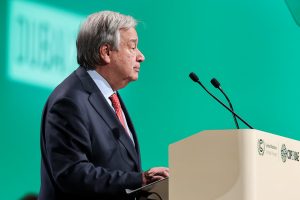
Meanwhile, United Nations Secretary-General, Antonio Guterres, says global commitment and action are needed for the further adoption of renewable energy.
“Our collective future depends on collective action that makes the work of IRENA critical,”
the UNSG said in his remarks at the Assembly.
Guterres said their task is to ensure the transition is fast enough, and fair enough – to limit the rise in global temperature to 1.5 degrees Celsius and bring the benefits of affordable clean power to everyone by 2030.
“Countries must act on their COP28 commitments – with the G20 in the lead:
“Accelerating fossil fuel phase-out this decade;
“Doubling energy efficiency and tripling renewables capacity;
“And presenting new national climate action plans by 2025, that align with 1.5 degrees and cover the whole economy;
“Without finance and support, this is simply impossible for developing countries.
“So, we need action: From the G20 – to mobilise the financial and technical resources they need. From developed countries – to deliver on their finance commitments” said Guterres.
He said IRENA needs– to intensify their support to countries preparing their new national climate plans.
“We also need a strong outcome at COP29, and reform of the business model of multilateral development banks to increase their lending potential and bolster their efforts to mobilise private finance.
“Together, let’s supercharge the renewables revolution,” SG Guterres said.






